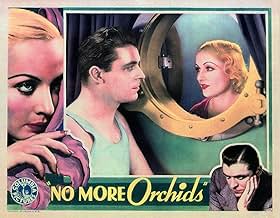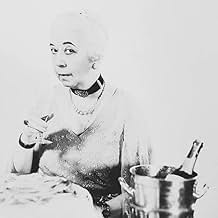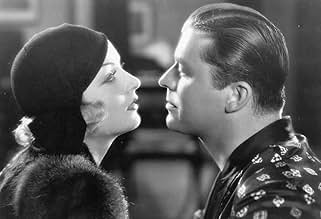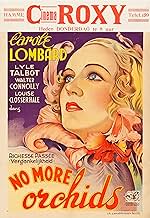An heiress forced to marry into royalty in order to save her banker father falls in love with another man while on a cruise.An heiress forced to marry into royalty in order to save her banker father falls in love with another man while on a cruise.An heiress forced to marry into royalty in order to save her banker father falls in love with another man while on a cruise.
- Director
- Writers
- Stars
Sidney Bracey
- Holmes
- (uncredited)
Belle Johnstone
- Housekeeper
- (uncredited)
Edward LeSaint
- Capt. Jeffries
- (uncredited)
Wilfred Lucas
- Banker
- (uncredited)
Charles Hill Mailes
- Merriwell
- (uncredited)
Harold Minjir
- Modiste
- (uncredited)
Broderick O'Farrell
- Benton -- Butler
- (uncredited)
William Worthington
- Cannon
- (uncredited)
- Director
- Writers
- All cast & crew
- Production, box office & more at IMDbPro
6.5576
1
2
3
4
5
6
7
8
9
10
Featured reviews
Reality hits her hard and soon
Carole Lombard was loaned from Paramount to Columbia to star in No More
Orchids in which she plays a spoiled heiress, not unlike the one she played in her
later classic My Man Godfrey.
She lives pretty high on the hog, but the pig is about to be slain as this is the Great Depression and the bank that her father Walter Connolly heads is about to go belly up. Her grandfather C. Aubrey Smith does not like his son-in-law.
But he does like his granddaughter and he wants Lombard to marry some empty suit with a title. He fancies being in-laws to nobility. He's got the empty suit picked out. but Lombard wants to marry lawyer Lyle Talbot.
In the end it's Connolly who makes the sacrifice so that Lombard can live her life with whom she loves. Won't say how.
Good performances all around. The revelation here is C. Aubrey Smith who usually plays stern but upstanding upper crust types is a real no good in this one. Good but way off type for him.
She lives pretty high on the hog, but the pig is about to be slain as this is the Great Depression and the bank that her father Walter Connolly heads is about to go belly up. Her grandfather C. Aubrey Smith does not like his son-in-law.
But he does like his granddaughter and he wants Lombard to marry some empty suit with a title. He fancies being in-laws to nobility. He's got the empty suit picked out. but Lombard wants to marry lawyer Lyle Talbot.
In the end it's Connolly who makes the sacrifice so that Lombard can live her life with whom she loves. Won't say how.
Good performances all around. The revelation here is C. Aubrey Smith who usually plays stern but upstanding upper crust types is a real no good in this one. Good but way off type for him.
A very well made emotionally literate tragi-comedy
Grace Perkins, the author of this story also wrote MY PAST and NIGHT NURSE which were both big impact, big juicy dramas for Warner Bothers around this time as well. This picture has that same strong narrative, a well-crafted sense of direction and an empathy with the charismatic leads. The characters feel like real people, they work well together and develop together. When however you stand back and look at the family to which Carole Lombard's character belongs you have to admit that such a family could only ever exist in fiction, they are a little ridiculous but because they're acted so well with such authenticity, you've abandoned your sense of reality ages ago. One of the reasons it all seems so believable is because for the first half of the film it's a kind of light comedy and the way your mind accepts such something like that is less critical than if it were a tough drama. By the time the film switches from comedy to tragedy (or rather something a bit more dramatic) your mind is fully engaged; a common but still clever little trick.
In essence, it's about a rebellious young heiress (yes, another one!) who rather unsurprisingly falls for the wrong guy (yes, it is that predictable). That's how the film hooks you in, using a familiar story peppered with good witty writing and convincing performances. About half way through it starts to get down to business but still retains that lightness and humour - mainly down to the Granma (played by Louise Closer Hale) who is brilliant...... and so is Walter Connolly (was it in his contract that every father in every Columbia picture of the early 30s had to be played by him?) and so is Carole Lombard (genuinely funny and lovely without doing all that annoying screeching she did in her later films). They're all so good - they're 'proper actors!' And I know I left Lyle Talbot out of that list..... he's not a bad actor he's just incredibly dull. Why would someone as bubbly and vivacious as Carole Lombard's Annie fall for the dullest man in America?
In summary, this is a really worthwhile way to spend an hour and a half if you enjoy a better than average early thirties drama with a splash of comedy thrown in. It's made by Columbia which was not known for its extravagant production budgets but this one feels as classy as anything MGM might have made. It's not got a deep message, it isn't one of those a Warner Brothers/Zanuck movies that will make you angry and want to change the world but it's engaging and good fun.
In essence, it's about a rebellious young heiress (yes, another one!) who rather unsurprisingly falls for the wrong guy (yes, it is that predictable). That's how the film hooks you in, using a familiar story peppered with good witty writing and convincing performances. About half way through it starts to get down to business but still retains that lightness and humour - mainly down to the Granma (played by Louise Closer Hale) who is brilliant...... and so is Walter Connolly (was it in his contract that every father in every Columbia picture of the early 30s had to be played by him?) and so is Carole Lombard (genuinely funny and lovely without doing all that annoying screeching she did in her later films). They're all so good - they're 'proper actors!' And I know I left Lyle Talbot out of that list..... he's not a bad actor he's just incredibly dull. Why would someone as bubbly and vivacious as Carole Lombard's Annie fall for the dullest man in America?
In summary, this is a really worthwhile way to spend an hour and a half if you enjoy a better than average early thirties drama with a splash of comedy thrown in. It's made by Columbia which was not known for its extravagant production budgets but this one feels as classy as anything MGM might have made. It's not got a deep message, it isn't one of those a Warner Brothers/Zanuck movies that will make you angry and want to change the world but it's engaging and good fun.
Great Cast
A wonderful cast of supporting character actors enlivens a soap opera about how Carole Lombard falls in love with reverse-snob Lyle Talbot and thwarts the plans of her grandfather -- played by the wonderful C. Aubrey Smith -- to marry his family into European royalty. In the meantime her father -- played by Walter Connolly -- is about to see his bank fail.
It seems apparent that the novel on which this book is based is a lot more complex than this movie. The dialogue is competent, but not great, and people tend to play types rather than individuals. But while this is not a great movie, the wonderful players make it far more enjoyable than anyone would expect it to be. Even Lyle Talbot, usually confined to a simple juvenile lead at his home base of Warner Brothers in this period, is excellent, if a tad declamatory.
It seems apparent that the novel on which this book is based is a lot more complex than this movie. The dialogue is competent, but not great, and people tend to play types rather than individuals. But while this is not a great movie, the wonderful players make it far more enjoyable than anyone would expect it to be. Even Lyle Talbot, usually confined to a simple juvenile lead at his home base of Warner Brothers in this period, is excellent, if a tad declamatory.
"I beat women who tidy bureau drawers."
Spoiled rich girl (Carole Lombard) falls in love with poor boy (Lyle Talbot). But her father's financial troubles may force her to marry a wealthy prince. Pre-Code soaper features a scene of Carole Lombard in her underwear, which is as good a selling point as any. Carole's good in this and, of course, beautiful. Talbot does okay. Nice supporting cast. Louise Closser Hale is great as Carole's grandmother, Walter Connolly her extremely likable father, and C. Aubrey Smith fine in a villainous role. Enjoyable enough. It's not a bad movie of its type. Helps if you're a big fan of Lombard. The ending seems silly on paper but was surprisingly effective.
A Movie That Deserves a Bigger Crowd
No More Orchids (1932)
*** (out of 4)
Interesting, if a tad bit strange, drama about a rich brat (Carole Lombard) who falls in love with an average guy (Lyle Talbot) but her greedy grandfather (C. Aubrey Smith) forces her to marry a rich Prince so that her father will be saved from his debt. NO MORE ORCHIDS isn't a very well known film and even fans of Lombard seems to have never seen it. That's a shame because it turned out to be a pretty good gem even if the final ten-minutes are extremely bizarre and in the end they really don't work. The film benefits from a very strong screenplay as well as some strong performances. The actual story of this thing is the type of melodrama that had been going on throughout the silent era and would continue throughout the 30s as we have the bad girl falling for a good guy only to be forced into the arms of someone else. What makes it seem so fresh and original here is that the screenplay is smart enough to actually make for some nice dialogue scenes where everything plays out in a believable fashion. This includes several scenes of Lombard having to really think through her decision and this makes for some very good drama. The screenplay is smart enough to make her character more than just a single note and the viewer certainly benefits from this. Lombard does a very good job as she was perfectly capable of playing the brat side of this woman but we also believe her when the character slowly starts to change due to her feelings for Talbot. As for Talbot, he too turns in another winning performance as does Walter Connolly as the father and Louise Closser Hale nearly steals the film as the fast-talking grandma. Smith turns in his typical fine performance as well. Fans of pre-code will be happy to see some rather risky dialogue about Lombard not being a virgin and we even get a sequence where she takes her rob off and is standing around in her bra and panties. Not too shocking in today's age but this was 1932 after all. The film takes a rather obvious twist towards the end and I think what the father does, which I won't ruin, doesn't work at all. The screenplay tries to milk this sequence for everything it's worth but I felt it fell flat on its face and didn't pack the punch it was going for. Even so, NO MORE ORCHIDS is still a fine little film that deserves to be seen by more.
*** (out of 4)
Interesting, if a tad bit strange, drama about a rich brat (Carole Lombard) who falls in love with an average guy (Lyle Talbot) but her greedy grandfather (C. Aubrey Smith) forces her to marry a rich Prince so that her father will be saved from his debt. NO MORE ORCHIDS isn't a very well known film and even fans of Lombard seems to have never seen it. That's a shame because it turned out to be a pretty good gem even if the final ten-minutes are extremely bizarre and in the end they really don't work. The film benefits from a very strong screenplay as well as some strong performances. The actual story of this thing is the type of melodrama that had been going on throughout the silent era and would continue throughout the 30s as we have the bad girl falling for a good guy only to be forced into the arms of someone else. What makes it seem so fresh and original here is that the screenplay is smart enough to actually make for some nice dialogue scenes where everything plays out in a believable fashion. This includes several scenes of Lombard having to really think through her decision and this makes for some very good drama. The screenplay is smart enough to make her character more than just a single note and the viewer certainly benefits from this. Lombard does a very good job as she was perfectly capable of playing the brat side of this woman but we also believe her when the character slowly starts to change due to her feelings for Talbot. As for Talbot, he too turns in another winning performance as does Walter Connolly as the father and Louise Closser Hale nearly steals the film as the fast-talking grandma. Smith turns in his typical fine performance as well. Fans of pre-code will be happy to see some rather risky dialogue about Lombard not being a virgin and we even get a sequence where she takes her rob off and is standing around in her bra and panties. Not too shocking in today's age but this was 1932 after all. The film takes a rather obvious twist towards the end and I think what the father does, which I won't ruin, doesn't work at all. The screenplay tries to milk this sequence for everything it's worth but I felt it fell flat on its face and didn't pack the punch it was going for. Even so, NO MORE ORCHIDS is still a fine little film that deserves to be seen by more.
Did you know
- TriviaWalter Connolly (Bill Holt) and Jameson Thomas (Prince Carlos) would again play a father and his prospective son-in-law in It Happened One Night (1934).
- Goofs(at about 6 mins) When Anne Holt is told to take off her dress, she is clearly not wearing a bra. Two edits (six seconds) later, Anne is seemingly struggling to pull her dress below her hips while wearing a bra, which she would not have had time to put on while simultaneously removing her dress.
- ConnectionsReferences The Poor Little Rich Girl (1917)
- How long is No More Orchids?Powered by Alexa
Details
- Release date
- Country of origin
- Language
- Also known as
- La consentida
- Filming locations
- Wall Street, Manhattan, New York City, New York, USA(establishing shot for the Banker's Club scene)
- Production company
- See more company credits at IMDbPro
- Runtime
- 1h 18m(78 min)
- Color
- Aspect ratio
- 1.37 : 1
Contribute to this page
Suggest an edit or add missing content







































